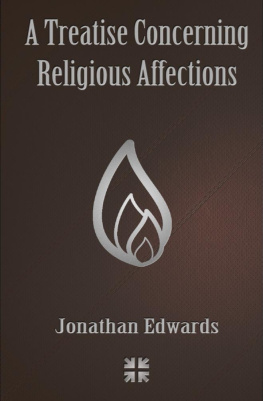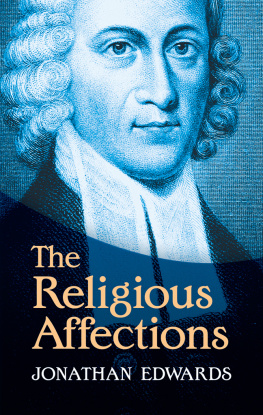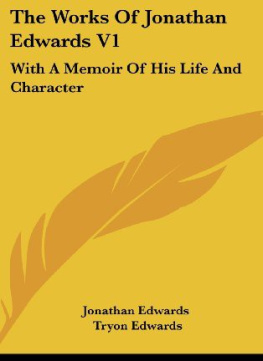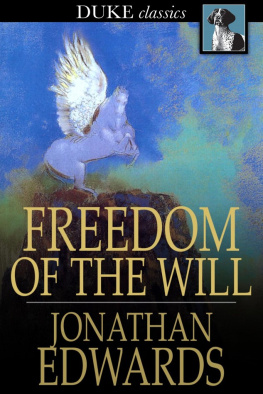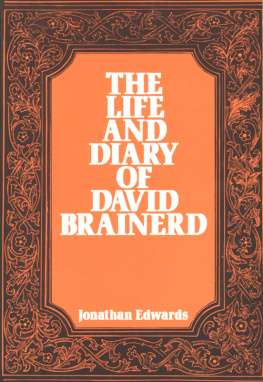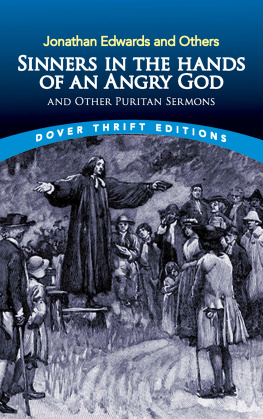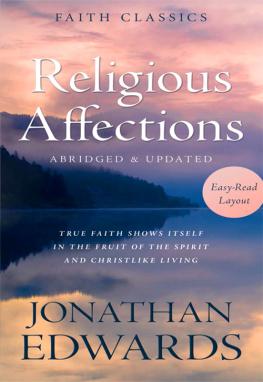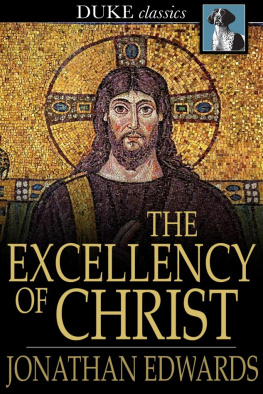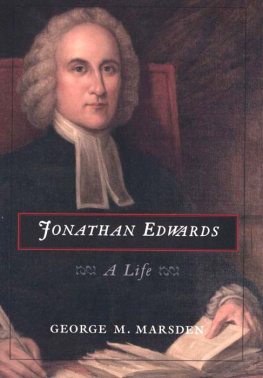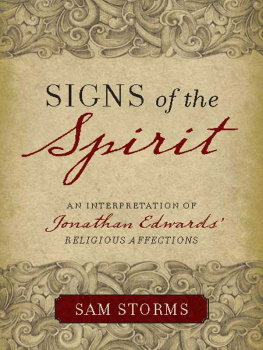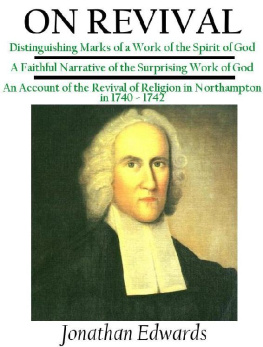Jonathan Edwards - A treatise concerning religious affections : in three parts
Here you can read online Jonathan Edwards - A treatise concerning religious affections : in three parts full text of the book (entire story) in english for free. Download pdf and epub, get meaning, cover and reviews about this ebook. City: Grand Rapids, Mich, year: [199-?], publisher: Christian Classics Ethereal Library, genre: Religion. Description of the work, (preface) as well as reviews are available. Best literature library LitArk.com created for fans of good reading and offers a wide selection of genres:
Romance novel
Science fiction
Adventure
Detective
Science
History
Home and family
Prose
Art
Politics
Computer
Non-fiction
Religion
Business
Children
Humor
Choose a favorite category and find really read worthwhile books. Enjoy immersion in the world of imagination, feel the emotions of the characters or learn something new for yourself, make an fascinating discovery.
- Book:A treatise concerning religious affections : in three parts
- Author:
- Publisher:Christian Classics Ethereal Library
- Genre:
- Year:[199-?]
- City:Grand Rapids, Mich
- Rating:3 / 5
- Favourites:Add to favourites
- Your mark:
- 60
- 1
- 2
- 3
- 4
- 5
A treatise concerning religious affections : in three parts: summary, description and annotation
We offer to read an annotation, description, summary or preface (depends on what the author of the book "A treatise concerning religious affections : in three parts" wrote himself). If you haven't found the necessary information about the book — write in the comments, we will try to find it.
A treatise concerning religious affections : in three parts — read online for free the complete book (whole text) full work
Below is the text of the book, divided by pages. System saving the place of the last page read, allows you to conveniently read the book "A treatise concerning religious affections : in three parts" online for free, without having to search again every time where you left off. Put a bookmark, and you can go to the page where you finished reading at any time.
Font size:
Interval:
Bookmark:
A TREATISE CONCERNING RELIGIOUS AFFECTIONS.
IN THREE PARTS.
BY JONATHAN EDWARDS
Table of Contents
INTRODUCTION.
THERE is no question whatsoever, that is of greater importance to mankind, and what is more concerns every individual person to be well resolved in, than this: What are the distinguishing qualifications of those that are in favor with God, and entitled to his eternal rewards? Or, which comes to the same thing, What is the nature of true religion? And wherein do lie the distinguishing notes of that virtue and holiness that is acceptable in the sight of God? But though it be of such importance, and though we have clear and abundant light in the word of God to direct us in this matter, yet there is no one point, wherein professing Christians do more differ one from another. It would be endless to reckon up the variety of opinions in this point, that divide the Christian world; making manifest the truth of that declaration of our Savior, "Strait is the gate and narrow is the way, that leads to life, and few there be that find it.
The consideration of these things has long engaged me to attend to this matter, with the utmost diligence and care, and exactness of search and inquiry, that I have been capable of. It is a subject on which my mind has been peculiarly intent, ever since I first entered on the study of divinity. But as to the success of my inquiries it must be left to the judgment of the reader of the following treatise.
I am sensible it is much more difficult to judge impartially of that which is the subject of this discourse, in the midst of the dust and smoke of such a state of controversy, as this land is now in, about things of this nature. As it is more difficult to write impartially, so it is more difficult to read impartially. Many will probably be hurt in their spirits, to find so much that appertains to religious affection, here condemned: and perhaps indignation and contempt will be excited in others by finding so much here justified and approved. And it may be, some will be ready to charge me with inconsistency with myself, in so much approving some things, and so much condemning others; as I have found this has always been objected to by some, ever since the beginning of our late controversies about religion. It is a hard thing to be a hearty zealous friend of what has been good and glorious, in the late extraordinary appearances, and to rejoice much in it; and at the same time to see the evil and pernicious tendency of what has been bad, and earnestly to oppose that. But yet, I am humbly but fully persuaded, we shall never be in the way of truth, nor go on in a way acceptable to God, and tending to the advancement of Christ's kingdom till we do so. There is indeed something very mysterious in it, that so much good, and so much bad, should be mixed together in the church of God; as it is a mysterious thing, and what has puzzled and amazed many a good Christian, that there should be that which is so divine and precious, as the saving grace of God, and the new and divine nature dwelling in the same heart, with so much corruption, hypocrisy, and iniquity, in a particular saint. Yet neither of these is more mysterious than real. And neither of them is a new or rare thing. It is no new thing, that much false religion should prevail, at a time of great reviving of true religion, and that at such a time multitudes of hypocrites should spring up among true saints. It was so in that great reformation, and revival of religion, that was in Josiah's time; as appears by Jer. 3:10, and 4:3, 4, and also by the great apostasy that there was in the land, so soon after his reign. So it was in that great outpouring of the Spirit upon the Jews, that was in the days of John the Baptist; as appears by the great apostasy of that people so soon after so general an awakening, and the temporary religious comforts and joys of many: John 5:35, "Ye were willing for a season to rejoice in his light." So it was in those great commotions that were among the multitude, occasioned by the preaching of Jesus Christ; of the many that were then called, but few were chosen; of the multitude that were roused and affected by his preaching, and at one time or other appeared mightily engaged, full of admiration of Christ, and elevated with joy, but few were true disciples, that stood the shock of the great trials that came afterwards, and endured to the end. Many were like the stony ground, or thorny ground; and but few, comparatively, like the good ground. Of the whole heap that was gathered, great part was chaff; that the wind afterwards drove away; and the heap of wheat that was left, was comparatively small; as appears abundantly, by the history of the New Testament. So it was in that great outpouring of the Spirit that was in the apostles' days as appears by Matt. 24:10-13. Gal. 3:1, and 4:11, 15. Phil. 2:21, and 3:18, 19, and the two epistles to the Corinthians, and many other parts of the New Testament. And so it was in the great reformation from Popery. It appears plainly to have been in the visible church of God, in times of great reviving of religion, from time to time, as it is with the fruit trees in the spring; there are a multitude of blossoms, all of which appear fair and beautiful, and there is a promising appearance of young fruits; but many of them are but of short continuance; they soon fall off, and never come to maturity.
Not that it is to be supposed that it will always be so; for though there never will, in this world, be an entire purity, either in particular saints, in a perfect freedom from mixtures of corruption; or in the church of God, without any mixture of hypocrites with saints, and counterfeit religion, and false appearances of grace with true religion, and real holiness: yet it is evident, that there will come a time of much greater purity in the church of God, than has been in ages past; it is plain by these texts of Scripture, Isa. 52:1. Ezek. 44:6, 7, Joel 3:17. Zech. 14:21. Psal. 69:32, 35, 36. Isa 35:8, 10, chap. 4:3, 4. Ezek. 20:38. Psal. 37:9, 10, 21, 29. And one great reason of it will be that at that time God will give much greater light to his people, to distinguish between true religion and its counterfeits. Mal. 3:3, "And he shall sit as a refiner and purifier of silver: and he shall purify the sons of Levi, and purge them as gold and silver, that they may offer to the Lord an offering in righteousness." With ver. 18, which is a continuation of the prophecy of the same happy times. "Then shall ye return, and discern between the righteous and the wicked, between him that serveth God, and him that serveth him not."
It is by the mixture of counterfeit religion with true, not discerned and distinguished, that the devil has had his greatest advantage against the cause and kingdom of Christ, all along hitherto. It is by this means, principally, that he has prevailed against all revivings of religion, that ever have been since the first founding of the Christian church. By this, he hurt the cause of Christianity, in and after the apostolic age, much more than by all the persecutions of both Jews and Heathens. The apostles, in all their epistles, show themselves much more concerned at the former mischief, than the latter. By this, Satan prevailed against the reformation, began by Luther. Zwinglius, &c., to put a stop to its progress, and bring it into disgrace; ten times more, than by all those bloody, cruel, and before unheard of persecutions of the church of Rome. By this, principally, has he prevailed against revivals of religion, that have been in our nation since the reformation. By this he prevailed against New England, to quench the love and spoil the joy of her espousals, about a hundred years ago. And I think, I have had opportunity enough to see plainly that by this the devil has prevailed against the late great revival of religion in New England, so happy and promising in its beginning. Here, most evidently has been the main advantage Satan has had against us; by this he has foiled us. It is by this means, that the daughter of Zion in this land now lies on the ground, in such piteous circumstances as we now behold her; with her garments rent, her face disfigured, her nakedness exposed, her limbs broken, and weltering in the blood of her own wounds, and in no wise able to arise, and this, so quickly after her late great joys and hopes: Lam. 1:17, "Zion spreadeth forth her hands, and there is none to comfort her: the Lord hath commanded concerning Jacob, that his adversaries shall be roundabout him: Jerusalem is as a menstruous woman among them." I have seen the devil prevail the same way, against two great revivings of religion in this country. Satan goes on with mankind, as he began with them. He prevailed against our first parents, and cast them out of paradise, and suddenly brought all their happiness and glory to an end, by appearing to be a friend to their happy paradisaic state, and pretending to advance it to higher degrees. So the same cunning serpent, that beguiled Eve through his subtlety, by perverting us from the simplicity that is in Christ, hath suddenly prevailed to deprive us of that fair prospect, we had a little while ago, of a kind of paradisaic state of the church of God in New England.
Next pageFont size:
Interval:
Bookmark:
Similar books «A treatise concerning religious affections : in three parts»
Look at similar books to A treatise concerning religious affections : in three parts. We have selected literature similar in name and meaning in the hope of providing readers with more options to find new, interesting, not yet read works.
Discussion, reviews of the book A treatise concerning religious affections : in three parts and just readers' own opinions. Leave your comments, write what you think about the work, its meaning or the main characters. Specify what exactly you liked and what you didn't like, and why you think so.

